
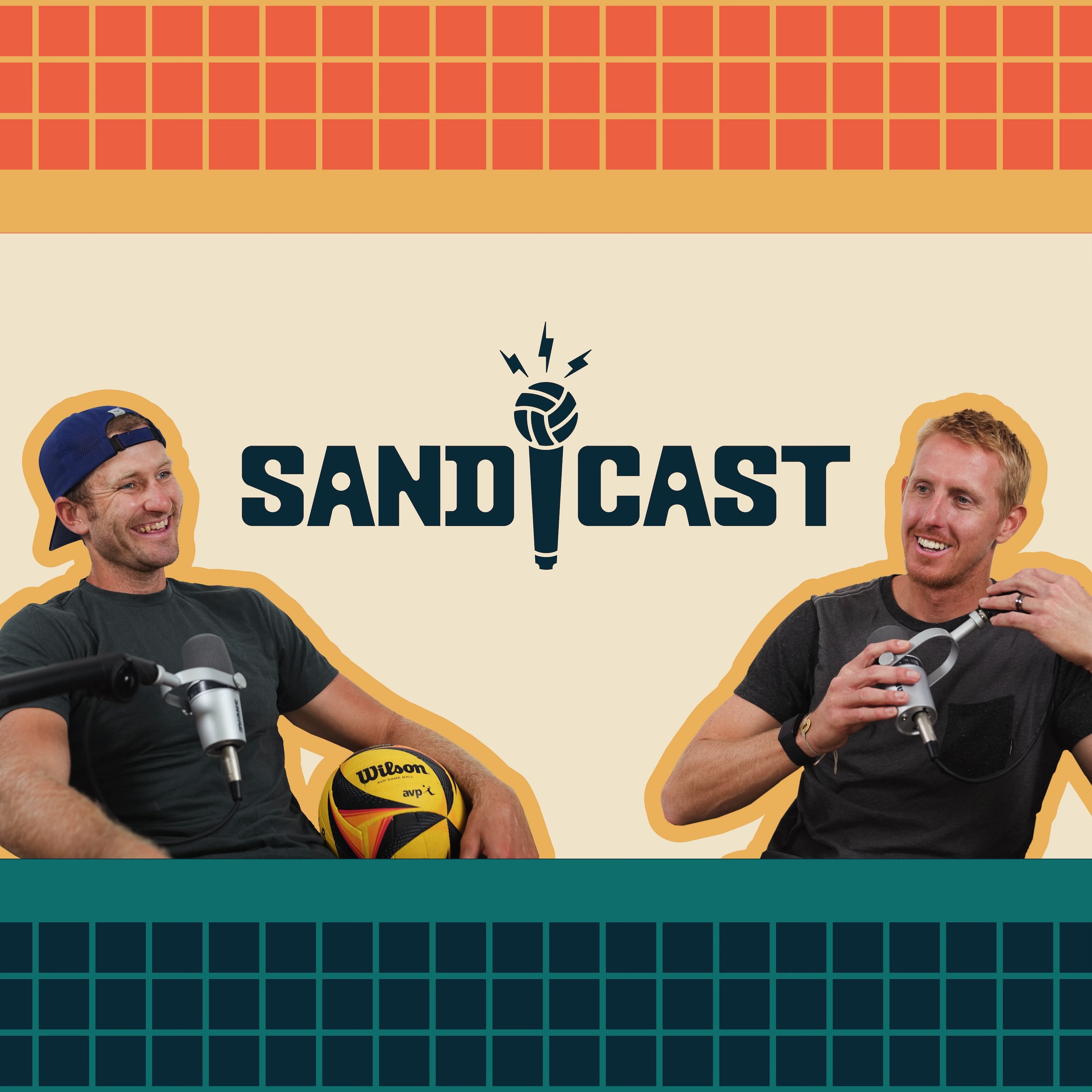
1.1M
Downloads
469
Episodes
SANDCAST is the first and leading beach volleyball podcast in the world. Hosts Tri Bourne and Travis Mewhirter take listeners into the world of the AVP, Volleyball World Beach Pro Tour and any other professional beach volleyball outlets, digging deep into the lives of the players both on and off the court as well as all of the top influencers in the game.
Episodes
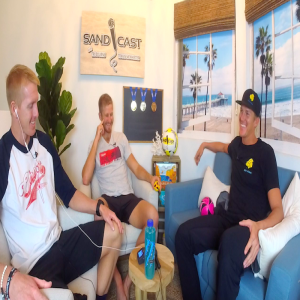
Wednesday Dec 18, 2019
Mark Burik: Adventuring and the power of ripple effects
Wednesday Dec 18, 2019
Wednesday Dec 18, 2019
Mark Burik tried it. You will notice that to be a theme of his life: The man just tries everything. In this case, a young Burik was trying his best, as a freshman at the University of Delaware, to sell his father on a month-long semester in New Zealand. His father balked.
Fourteen-thousand bucks? What was Mark going to learn in New Zealand that could possibly be worth $14,000?
Well, Mark replied, we’re going to go zorbing.
If you’re wondering what in the world zorbing is, allow Burik a moment to explain.
“It’s when you get put in a clear bubble and they send you rolling down a hill,” he said on SANDCAST: Beach volleyball with Tri Bourne and Travis Mewhirter.
So, no, Mr. Burik was not going to hand his son a $14,000 check to go zorbing in New Zealand. But he did have faith that Mark would find his way to New Zealand at some point, and he’d get to go zorbing or bungee jumping or hopping off of bridges or whatever else he would do – and studying was likely not one of them – on his own dime.
“Once I got the volleyball bug,” Burik said, “I knew I was going to take it as far as I can.”
He means far in every possible sense of the word. Physically, he has gone quite far, to the point that when his longtime girlfriend, Janell Haney, suggests what could be a fun overseas trip for the two, Burik will reply, “Oh yeah, that place is fun.” And then she’ll get frustrated, because she wants to go somewhere new, but finding a new place in the world for Burik to travel is quite a difficult endeavor these days.
He’s gone bungee jumping in New Zealand. Played on the national tours in Austria, France, Norway and Sweden. He’s run volley camps in Germany, Spain, Switzerland. He’s flown in helicopters in Rio, been discouraged at the state of an FIVB one-star in Cambodia.
“I’ve just had trouble saying no to tournaments and saying no to an adventure or trip,” Burik said. “It’s too much fun. There’s too much world to go and see to say ‘No.’ And if volleyball is either your ticket or your excuse, why not?
“I think I love the fact that even if I’m going somewhere to travel, I’ll hunt down my local volleyball contacts, because if you’ve got a sport like volleyball, and you’re pretty good at it, you have built-in friends wherever you go. You don’t even have to do all the tourism stuff and wonder where you have to go because your built-in friends will bring you.”
Burik now is one of those volleyball contacts for players all around the world who are looking for a place to play or train or build a community at any time of the year. Five years ago, Burik founded VolleyCamp Hermosa, a now-booming and wildly popular adult camp of sorts for players of all skills and ages.
He founded it, of course, on some of the most ridiculous premises. He wanted it to be a volley hostel, where he’d find all of the broke and hungry 20-somethings in the sport, give them a bunk to crash in, a court to play on, and a bunch of guys to play with, and let it run wild. It worked for a bit. Burik rented three apartments, squeezing in four bunk-beds in the master bedroom of one.
“It was so much fun and so crazy,” Burik said. “I was cleaning toilets at 3 a.m. getting ready for the next turnover.”
To the surprise of perhaps only Burik, he was evicted from one of his houses – “I did it all legally,” he is adamant to assure you – and has since sent the VolleyCampers to local hotels, where he does not have to clean toilets at three in the morning. Though the hostel vision for VolleyCamp has since changed, the impact of it has only multiplied. Rare is the day you will not see Burik and his coaching staff on second street in Hermosa, teaching from sun-up to sundown, VolleyCampers rotating in and out of the courts the entire day, all year long.
“It’s gotten to a point where it runs itself,” Burik said. This has allowed him to expand into other projects, all in the name of growing the sport. He’s building a YouTube channel, Betteratbeach, with an eponymous website, betteratbeach.com. He’s authoring webinars. Conducting film studies with players from all over the planet via FaceTime and screenshare.
“If you get one, solid piece of advice from one great coach, that’s going to affect the rest of your career,” Burik said. “People think one piece of advice is just one piece of advice but it’s not. It’s thousands of points.”
But it’s not just about improving as a player. It’s about building up this sport that has for so long needed a growth spurt. It’s about building the community that allows players to grab dinners with strangers in Austria, to crash on a couch in Rio, to know the best local spots in Spain, with the only connecting thread being the sport of beach volleyball.
“It goes beyond beach volleyball for me,” Burik said. “It’s about getting a platform. My why is more – get the platform to start making the world better. I think I do that successfully with my coaching. I think I teach people how to be better partners, how to talk to each other better. I teach them how to talk to their partners, similar to how they talk to their wife or girlfriend. You don’t want to nag, you know? You want to build each other up. In the end, my why is about getting a platform and helping, even a couple people. It’ll make their lives a little bit easier.”
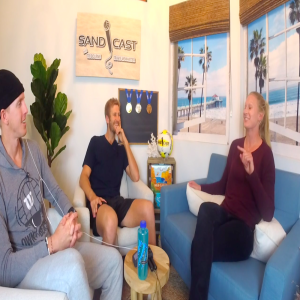
Wednesday Dec 11, 2019
Gettin' jazzed with Kelly Reeves
Wednesday Dec 11, 2019
Wednesday Dec 11, 2019
There is a moment before every practice that is so innocuous, so easy to forget that it’s not all that uncommon for teams to go about practicing without remembering it at all: putting up the antennas.
And yet it is that moment that Kelly Reeves loves – or, in her vernacular, “gets jazzed about” –as much as she loves anything, and allow us to inform you early in this story that Kelly Reeves loves a great many things.
But before she can discuss how much she loves playing volleyball, how jazzed she gets about this game, how she loves the long rallies, getting a scoop on a hard-driven, or the feeling of her lungs searing at the end of a long, three-set match, she wants you to know how much she loves putting up those antennas each morning.
“That’s my moment before practice, setting up the antennas,” Reeves said on SANDCAST: Beach volleyball with Tri Bourne and Travis Mewhirter. “It’s like ‘This is where I’m supposed to be.’ People overlook that. I always set the antennas up, but that’s something I just enjoy. I just look around at the bay and it’s like ‘Wow, life’s pretty good.’ It’s just what I do and I’m like ‘I love being here.’”
It’s possible that Reeves, who won a national championship indoors at UCLA before starting her professional career on the beach, loves more aspects of volleyball, and life, than anyone you’ve met. Workouts that leave her heaving, worn out, walking gingerly out of the gym? Loves them. Rallies – even the ones she loses – that leave her caked in sand, sweaty, out of breath? Loves them. Heck, the 27-year-old even loved, in a weird sort of way, getting roofed by Alix Klineman on match point in the quarterfinals of the Manhattan Beach Open.
“It was just so surreal playing against the top teams in the world like ‘What? This is awesome!’ What a fun experience,” said Reeves, who finished a career-high third in Manhattan with Terese Cannon, losing only to April Ross and Klineman and Melissa Humana-Paredes and Sarah Pavan. “And, obviously, we lost to both of those teams, and I give Alix a little [crap] because I got absolutely roofed on match point. I was like ‘Either way I’m going in to crank it and see what happens’ and there’s a photo of Alix just reaching her hand, dink, and I’m like ‘C’mon! You couldn’t give me just one?’ But I respect both of those teams and it’s elite volleyball, it’s high level volleyball, and that’s what you want, that’s how you get better.”
Reeves understands the process more than most. It’s why she allows herself to stop and enjoy the peaks like in Manhattan. Where many, after achieving a career-high, seek the next high, Reeves is consciously aware to stop, as she did in Manhattan, and pause for a second to drink in the bliss.
“I just looked around and smiled, like ‘I’m here. This is the biggest stage probably anywhere’ and I had to just soak up the moment,” she said. “It was so awesome.”
And she loves the lows, too, in that strange sort of way that mature athletes do, understanding that there are moments of growth within those lows. She looks at Chicago, where her and Cannon, coming off that career-high in Manhattan, lost both matches and finished 17th.
“You gotta go through the trenches a little bit to see the good and it’s been such a fun journey to be a part of and that’s why longevity for me, you can go forever in beach volleyball,” Reeves said. “There’s just so much you can learn every single day you step foot in the sand.”
At the moment, Reeves is learning as much as she can in the gym. She’s in there, three hours a day, Monday through Friday. She’s playing the long game now, prepping her body for a career that she wants to last as long as possible. John Hyden’s still doing it at 47, Jake Gibb at 43, Kerri Walsh Jennings at 41. She has as much self-doubt as anyone, Reeves. But when those moments of doubt arise, and the numbers in her bank account are looking as if they’ve been on an extreme diet, she journals, does a little introspection: Where’s my bliss?
And then it all comes rushing back, all the love she has for this sport and everything and everyone in it. In an hour-long interview, Reeves used the word “love” no less than 30 times. So it really doesn’t matter what her bank account looks like, because no amount of money in the world can buy that kind of bliss, that self-assurance that, yes, she’s exactly where she needs to be, doing exactly what she needs to be doing, with the people she needs to be with.
“I just love the sport of volleyball,” she said. “I think it brings me joy, it’s made me the person I am, I just love stepping out on the court and sharing the game with anyone and everyone.”
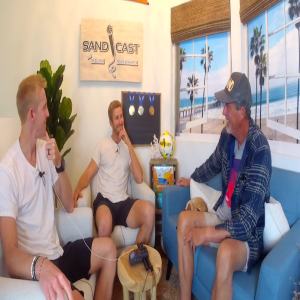
Wednesday Dec 04, 2019
Mike Dodd: Finding the soul of the game
Wednesday Dec 04, 2019
Wednesday Dec 04, 2019
Mike Dodd apologized.
He’d been getting all wound up, or as wound up as the man, labeled by anyone you ask as one of the nicest guys in the world, can get. He even dropped the f word not once, but twice.
“Sorry about that,” he said on SANDCAST: Beach Volleyball with Tri Bourne and Travis Mewhirter. “I think I said the f word.”
You can forgive the man for being impassioned. He’s seen beach volleyball in its every iteration, every stage of its growth, from infantile to colossus to broken to slightly built up once more. He competed when there was hardly any money in it at all, in the early 1980s, when he was fresh out of college and finished with a brief – very brief – stint in the NBA with the San Diego Clippers. He’d boycotted the 1984 World Championships, not only witnessing the formation of the AVP – then only a players’ union, not a tour – but playing an integral part of it. He’d won five consecutive Manhattan Beach Opens with Tim Hovland. He’d talked smack to Sinjin Smith and Randy Stoklos. He’d played in and won the only Olympic qualifier to date, securing a spot in the 1996 Atlanta Games with Mike Whitmarsh, where they’d win silver in one of the greatest shows of dominance the United States has had on the beach, on the men’s side, at least.
And he’s since commentated (in 2000 and 2004) and coached (in 2008 and 2012) and you won’t ever find the man too far off the beach. He’s not one to preach about the old-school days, as some, mostly fans, are wont to do. But he does look at the current landscape of the game in the United States and wonder if there isn’t a simpler solution to the sometimes-complicated hierarchy.
“If I were the czar of USA Volleyball, I would mandate that my eight best guys would just go down. Just go down for five hours in the afternoon, when it’s windy and [crappy] and it’s not little morning 9 a.m. perfect, no wind, no nothing,” he said. “Draw your lines, switch partners, and see who’s the fu***** best. See who’s the fu***** best. Keep score. Keep track. It’s an easy pick.”
It was less about the money than it was about who won, who had bragging rights in an era of bombastic bragging and smack talk, and few won more than Dodd. Few, lest the tour returns to its halcyon days of 20-30 tournaments a year, ever will. Seventy-two times Dodd finished atop the podium in the United States, 73 if you include winning that Olympic qualifier in Baltimore in 1996, which Dodd does.
“If you don’t think an Olympic trial prepares you for the Olympics,” he said, “you’re outta your mind.”
Yet it hasn’t been done since. The FIVB has become the road through which U.S. teams must qualify for the Games. For now, at least. There are other countries who operate differently. Dodd has seen it himself.
Prior to the 2016 Games, he was hired by the Italian federation as the beach program’s head coach. They rented a house in Southern California for the eight potential candidates, and what did Dodd do but bring them out to the beach, draw up some lines, and have them play. They’d mix partners, play in the wind, in the most imperfect conditions. And he’s see who wanted it most, who could just find a way to win, just as he used to do during those endless days when he was a 20-something kid out of San Diego State.
He and Hovland and Karch Kiraly and Sinjin Smith would practice for four hours with the United States indoor national team, put in another hour of jump-training, then find the closest liquor store, pick up a couple of Mickey’s big mouth beers, and play beach until the sun went down. And they’d learn how to win.
It is hardly a matter of coincidence that those four are now all in the Hall of Fame, four of the winningest players in history, four individuals where only a single name will do – Hov, Dodd, Sinjin, Karch – and you know exactly whom they mean.
“It was just the jungle,” he said. “It was natural selection. Smith and Stokie, they’re winning, they’re great. Dodd and Hovland. Dodd and Whitmarsh. This team and that team. You migrated to each other and you did it by survivial because you had the best chance of winning. There was money and this but everybody just wanted to win. At the end of the day, it’s how many opens did you win.”
And then, coaching those eight Italian players a little less than a decade ago, he saw those very same traits emerge again. A cocky, swaggering young player named Daniele Lupo was rooming with Paolo Nicolai, a 6-foot-8 blocker who had won consecutive youth world tour events in 2007 and 2008. When Dodd swung by the house, as he sometimes did, he saw them, after hours on the beach, dinking a ball back and forth in their room, competing still.
“I had the analytics that said they were probably the best team,” he said. “But that’s what told me they would be the best. They just had the love for the game.”
Sure enough, in 2012, Lupo and Nicolai would qualify for the London Games, stunning Phil Dalhausser and Nick Lucena in the first round. Then they’d claim silver in Rio in 2016.
It’s that love of the game that Dodd wants to see.
Who wants it more?
Who wants to be king of the jungle?
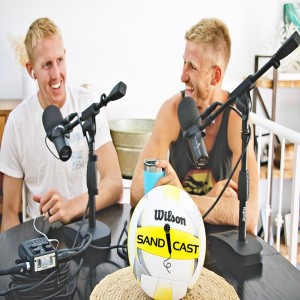
Wednesday Nov 27, 2019
The Free Agent Podcast: Who's playing with who in 2020
Wednesday Nov 27, 2019
Wednesday Nov 27, 2019
This week on SANDCAST, Tri Bourne and Travis Mewhirter break down all of the partner switches happening in United States beach volleyball.
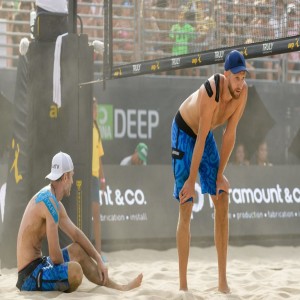
Wednesday Nov 20, 2019
Theo Brunner has undergone his beach volleyball 'rebirth'
Wednesday Nov 20, 2019
Wednesday Nov 20, 2019
Theo Brunner was in need, he says, of a rebirth. Not quite a religious ceremony, but something to revitalize a beach volleyball career that had, while not sunk, gone a bit sideways. There was the chronic calf injury that flared up, a nod to the fact that he hadn’t really taken a full off-season in several years. There were the flashes of success – a silver at the Kuala Lumpur three-star with Reid Priddy – sprinkled in with missed opportunities – two crushing three-set losses in country quotas in Gstaad and Rome.
The proverbial rebirth came in the most unwelcome of places, at the most unwelcome of times. Funny how it works like that.
Theo Brunner was thrown back into an AVP qualifier.
“At first I was super-bummed,” he said on SANDCAST: Beach Volleyball with Tri Bourne and Travis Mewhirter, of he and John Hyden being seeded Q1 at AVP Chicago. “But then I thought, this is good for me. It’s good to remember what it’s all about, see what everybody else has to go through every tournament, stop being all high horse, who cares about the qualifier. To get back in there was a nice thing.”
It’s easy to say that in retrospect, of course. It would not have been easy for him to say that midway through the afternoon of August 29, when he and Hyden were down one set to none – 15-21, no less – to Jake Urrutia and Earl Schultz in the final round of the qualifier. Losing the second or the third would have meant the first failed attempt at an AVP main draw since 2009, when he and Matt Heagy fell in the second round in Ocean City.
“I was like ‘Ah crap, what am I doing?’” Brunner said. “But it was a good reminder of the love of the grind, which you can forget sometimes.”
Throughout literature, any moment of rebirth, of finding a new identity or rediscovering an old one, requires a trial. Brunner had his. And he and Hyden prevailed, winning the next two sets, 21-13, 15-7.
It wouldn’t be until three weeks later, though, when he and Hyden were put back into the qualifier again, that they would return to the championship winning team they had been a year prior. It had barely been more than a calendar year since they won AVP Hermosa, coming back at the freeze to beat Billy Allen and Ryan Doherty, 16-14, in the third.
They did that, however, as the one seed.
In Hawai’i, for the final event of the year, they’d do so also as the one seed – in the qualifier.
Just as they did in Hermosa the year before, they returned to the final. And then the most poetic stories of the year came to a crashing halt. Hyden, at 47, would have broken his own record as the oldest to win an AVP title, in searing heat and shallow sand, no less. Had it not been for a Herculean performance from Taylor Crabb, Brunner and Hyden would have locked up the greatest storyline of the year.
Alas, a 20-15 lead in the second set was undone by Crabb and Jake Gibb, just as another lead in the third was undone, thwarted once more by the Bug and Gibb.
“Oh, Hawai’i,” Brunner lamented more than once on SANDCAST. “Still hurts.”
And it will hurt for some time, to be sure, but never has there been a rebirth without a bit of discomfort. Brunner is now entering the off-season, his first blessed off-season in as long as he can remember, one of the most coveted free agents in the sport. Hyden has turned to Bill Kolinske, but after that, who knows where the chips may fall.
Do Casey Patterson and Chase Budinger stay together? Billy Allen and Stafford Slick? Chaim Schalk and Jeremy Casebeer? Priddy?
“It goes from the top down and I’ve been fortunate enough that I’m one of the guys people are waiting on,” he said. “I’ve been enjoying not being super focused on that stuff this off-season but I still have a bunch of people in mind and have chatted with a few different people.
“My wife forced me to watch the bachelor and it just occurred to me that this is a lot like the bachelor. Just trying to find a mate for next season. It’s a lot like a relationship – this guy is really good at this, but I don’t know if we’d get along that well. It’s pretty funny.”
And life, in beach volleyball, is fun again for Theo Brunner.
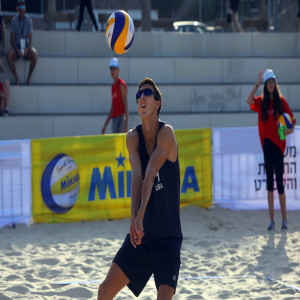
Wednesday Nov 13, 2019
Tim Brewster is getting his own type of education
Wednesday Nov 13, 2019
Wednesday Nov 13, 2019
TEL AVIV, Israel – Tim Brewster was thousands of miles from his classrooms at UCLA. His seat in his 300-plus-student lectures was empty again, as it had been for the previous two weeks while he was in the Dominican Republic and the Middle East. And yet, while his classmates and peers were in their seats like good students, listening to the professors, taking their notes, studying, Brewster was getting an education of his own, the same unofficial independent study he’d been getting for the previous three years.
It is one thing to learn about the religions of the world, a class he took with that very name. It is entirely another to stroll the cobblestone streets of Jerusalem, to walk the Via Dolarosa, to see the 14 stations of the cross, to touch the Western Wall, to hear the calls for prayer at the site where Mohammed ascended and descended from heaven.
It is one thing to learn of the poverty of countries like Cuba, and to listen to professors discuss the dangers of men like Fidel Castro. It is another to arrive on your first international beach volleyball trip as a 17-year-old in Havana, and to run out of running water one night, lose power for two, be bereft of functional wifi and any means of communication to the outside world, all the while being subjected to misleading government propaganda.
No, Tm Brewster may not be in the classroom as much as his professors may like.
But rest assured, he’s getting an education of his own.
“Definitely more valuable than college,” he said on SANDCAST: Beach Volleyball with Tri Bourne and Travis Mewhirter. And he said this, of course, not from a classroom or anywhere close to it. He said it at the kitchen table in an AirBNB in Tel Aviv, where he played in his fifth one-star FIVB of the year, finishing with a career-high fifth. He said it after eating in Old Town Jaffa, after praying in the Garden of Gethsemane, after hearing gunshots ring out from war-torn Jordan as he floated in the Dead Sea.
“I’m going to these places that I’ve learned about in school before, which is awesome. I’m getting the real-world experience of it,” he said. “I’m getting to see these cultures and learn a bunch, especially from the people I’m traveling with, because a lot of people I travel with are older. I wouldn’t miss this stuff for the world.
“I took a religion class last quarter and it was all about Christianity, Judaism and Islam and it’s what we saw today, all day. I’ve never really experienced that. It was crazy.”
Talk with Brewster and, aside from the boyish face and the body that hasn’t quite filled out yet, you would be hard-pressed to pin him as a teenager still finding his way in the world. This season alone, which coincided with his current sophomore year at UCLA, he competed in seven international tournaments. He’s competed against Olympians and AVP champions. He’s been coached by some of the all-time greats. He is 19 yet is surrounded by some of the most elite players and voices in the sport.
“It’s weird because these are guys I’ve looked up to for the last five or six years since I was 14 and playing,” he said. “It’s weird that I’m playing against them now. I’m still not there yet but I can see the progress from where I’ve come from and where I’m heading and it’s pretty exciting. It’s really cool, though, getting to play guys at that high of a level and you get to see the things they do well that you don’t.”
At 19, Brewster is considered precocious by U.S. standards in beach volleyball. Nearly every Olympic Games is a testament to the States’ delayed development system. In 2016, the four United States players – Phil Dalhausser and Nick Lucena, Jake Gibb and Casey Patterson – were surpassed in age only by one. Of the six players on the top three U.S. teams with a legitimate shot at making the Tokyo Games, four are older than 30, another, Trevor Crabb, is only a few months shy, and the other, Taylor Crabb, is 26.
And yet there is Brewster, alongside his equally young and aspirational peers in John Schwengel, Miles and Marcus Partain, and Kacey Losik, the few youngsters in the U.S. breaking in before their mid-20s.
This year was a watershed one for all: Brewster made his first FIVB main draw, Schwengel cracked into AVP Hawai’i for his first main draw, Marcus Partain made it in Manhattan Beach, Miles won the AVP Rookie of the Year.
To the United States, they’re young, babies on tour. To the rest of the world’s 19- and 20- year olds, they’re quite normal.
“There’s not a lot of guys my age who are committed only to beach,” Brewster said. “There’s John Schwengel and I, who are basically the only two who are only playing beach without playing indoor.
“A lot of these [international] kids specialize early, and a lot of these countries have academies. We don’t really have anything like that. I think the high performance does a good job but it’s hard to compete with a country like Brazil who has their kids living in a facility, training year-round.”
And so he has created his own developmental system, both on the court and off. On the court, he trains with USA Volleyball’s high performance program when it’s in session and with Jose Loiola when it’s not. Off the court, he is still figuring out his major at UCLA while seeing a great many of his lectures play out in real life while he competes internationally.
“Cuba was my first international trip and it was just wild,” he said. “There’s no way to describe it but just wild and crazy. Everything that could have gone wrong went wrong, and everything we expected wasn’t there.
“It definitely taught me how to travel in a different way. I’m trashing Cuba but it was one of the most fun trips of my life. There’s something about adversity that bonds you to the people around you. There’s something about traveling. Nothing else matters but can you talk to each other, can you have fun, can you get through these crazy experiences together. It’s the little things like that that make traveling internationally to play volleyball so cool. The friends you make, the things you get to see, doing what you love, nothing beats it. It’s amazing.”
He’s back in school now, Brewster. Cramming for tests. Finishing papers he’s put off. Getting the education most Americans his age are accustomed to. Soon enough, though, he’ll be back on the road, on planes, figuring out how to get from one airport to the next, how to find edible food in China, bottled water in Cuba, seeing with his own eyes the religions of the world.
“Almost,” he said, “like college on the road.”
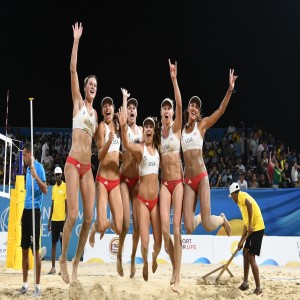
Tuesday Nov 05, 2019
Karissa Cook and Allie Wheeler: The Snow Dog Desert Queens of Weird
Tuesday Nov 05, 2019
Tuesday Nov 05, 2019
Karissa Cook is a self-dubbed “inside cat.” She doesn’t need to go anywhere to have fun. Doesn’t really need to see anybody, aside from her fiancé, Shayne Skov, and her pup. She’s good with that.
So when Katie Spieler, her partner throughout the 2017 and 2018 beach volleyball seasons, asked if she wanted to play in a NORCECA playoff for a one-off event in a pinprick of an island named Martinique, she felt very little compulsion to do so. But she did, because Cook loves Spieler, and she does – though she rarely admits it out loud – love volleyball, event at the end of a year.
She was in.
And so began one of the strangest, world-crossing, successful years of Cook’s life. Her and Spieler would win gold in Martinique, which wasn’t so much a beach tournament as it was “jungle ball,” as she dubbed it on SANDCAST: Beach Volleyball with Tri Bourne and Travis Mewhirter, seeing as it was played in the middle of a tropical forest, in a grove of cleared out trees.
In reality, it would be one of the most normal events Cook would play over the next calendar year. A month later, Cook and Spieler were chatting again, about a new, slightly absurd invitation to play snow volleyball in Russia in December. They added Allie Wheeler and Emily Hartong to the crew, and thus the “Snow Dogs” were born.
“I feel like this year is still bookended by Moscow because that was the origination of the snow team,” Cook said. “Looking back on these 12 months, I’m like ‘How did we get roped into all these strange, amazing country trips and all these amazing environments?’
“Basically, USA keeps emailing and we keep saying yes. Every time, I’m like ‘I’m done for the year’ and then I get an email saying ‘Do you guys want to…’ and I’ll probably say yeah.”
For Wheeler, there is never a hesitation. Not anymore. She said yes immediately to Moscow, and everything thereafter.
Did she want to play snow volleyball in Austria and Italy, three weeks before the AVP season? Yes. And another in Argentina? Yes. How about a fours tournament at the inaugural World Beach Games in, of all places, Doha, Qatar?
“It’s always just ‘Yes,’” Wheeler said on SANDCAST.
It’s easy to see why, too. Every time she’s said yes, she’s returned home with gold. When she agreed to play a one-star FIVB in Vaudz, Liechtenstein, in August of 2018, as the No. 12 team in the qualifier, they wound up winning the whole thing. Perhaps her decision making is expedited by the fact that her goal is rarely about the winning, though for anybody as competitive as Wheeler, a national champ at USC, winning is always a plus.
“For me, I think about it – in Liechtenstein, me and Lara were down, 13-12, in the third set in the quali, obviously terrible scenario, so we were like ‘Alright, it’s a win win. If you lose you get to travel. If you win you get to play more volleyball,’” Wheeler said. “We ended up winning and then won the whole tournament so it was pretty cool.”
Everything about this year has been cool for the two. Cook has won events in a forest (Martinique) and in snow (Moscow). She won her first AVP, in Austin, and claimed gold at the Pan American Games with Jace Pardon in Lima, Peru. Together, her and Wheeler, adding Geena Urango and Kelly Reeves to the snow team, won the inaugural World Beach Games in Doha.
“This year, I went into it with a lot of uncertainty, but my only two goals were to not get burned out and be really conscious with my limits and not doing too much because I feel like I have to,” Cook said. “And then just to play with really good people. I think getting slightly more points than opponents was cool, but it was just a cherry on top. Winning helps, it definitely makes it more fun, definitely preferable, but I can’t control that.”
So here’s what they can control: The mindset and the team they bring with them. They’re all close friends now, the snow dogs, and the two “desert queens” in Urango and Reeves. Good friends and world champs.
“Well they’re going to pay for us to go to cool places so long as we keep winning,” Cook said. “So let’s do it.”
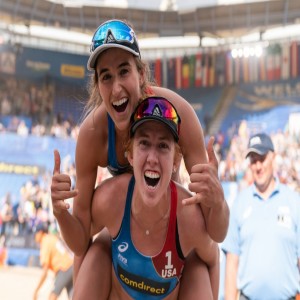
Tuesday Oct 29, 2019
Tuesday Oct 29, 2019
It was somewhere in the space between the Gstaad Major and the Espinho four-star when the façade came crashing down.
How long had it been since Sarah Sponcil had decompressed? Relaxed? Reflected on all that had happened in her life in the past six blurs of months?
In that span, she and Lily Justine, her partner at UCLA, established themselves as the best No. 2 NCAA beach pair in the country. In May, the Bruins repeated as NCAA champions. Days later, Sponcil was on a flight with Kelly Claes, her professional partner, to Itapema, Brazil, for an FIVB four-star where they’d play Kerri Walsh Jennings and Brooke Sweat in a country quota.
They lost in 28 minutes.
“It’s such a surreal fast-paced experience, national championship to pro in three days, trying to adjust my game to match the opponents, the best in the world,” Sponcil said when she and Claes joined us on SANDCAST: Beach Volleyball with Tri Bourne and Travis Mewhirter. “I’m just speechless when I’m asked that question. You’re never ready. You never know what you’re really doing and if I didn’t (go for the Olympics), I’d regret it for the rest of my life.”
On the outside, though, it very much appears as Sponcil is ready for all of this, as if she has keeping up with her rapidly-changing world, no problem. She and Claes rebounded from Itapema with four straight top-10 finishes, including a ninth at the FIVB World Championships.
They didn't just look like they knew what they were doing. They made it look -- dare we say? -- easy.
On top of all of that, in Warsaw the week before, while the rest of Sponcil’s teammates and classmates at UCLA were walking across the stage back home, Sponcil and Claes put on a comical photo shoot of Sponcil “graduating,” cap and gown included, diving for a ball on the sand.
It can all look so glamorous sometimes -- the world traveling, the funny Instagrams, the hilarious videos of them running through airports and Sponcil walking around the world doing handstands -- that it’s easy to forget that she’s never done any of this before.
“Sometimes I can’t even wrap my head around how stressful this year has been for her,” Claes said. “I think back to my first season coming out of college. We finished the USA Pairs Championship and jumped on a flight to Rio. We jumped on the world tour and it was so stressful and we had so many new things coming at me and I felt like my head was spinning and on top of that it’s an Olympic qualifying year for her.”
And then, after dropping in the qualifier in Gstaad, now two months on the road with stops in Portugal, Tokyo, Vienna, and Moscow still looming, Sponcil let down her guard.
“Sarah sent me a text to come outside and she’s balling,” Claes said. “And I’m like ‘OK, we’re doing this.’”
They’re a fun-loving duo, Claes and Sponcil. They’re goofy and happy and wildly talented, two of the top players in the country despite being in diapers when Kerri Walsh Jennings, who they’re trying to beat out for the 2020 Olympics, was making her Olympic debut on the beach. But they are -- in spite of how magnificently tailored their lives may look at times -- human. Three months on the road is a monumental task for a human being, much less one who had never done any of this before. Full-time World Tour, Olympic race, figuring out flights and hotels and meals and how in the world to survive this thing.
“Honestly, I felt like I had nothing together,” Sponcil said. “I was missing home, I felt like I was trying to change so many different things in my game, and you can’t change a whole lot and still feel like you’re playing free. Everything was just crazy in my mind, and definitely had some teary moments, and I was just honest with Kelly and open and vulnerable and I was like ‘I am not OK right now.’
“To get closer you have to be vulnerable in those positions and it sucks to acknowledge that you don’t have it all together, especially coming off of college where you had everything. You did so well and now you’re being pushed in ways you didn’t think you could be pushed because you won a month ago, on cloud nine, and now it’s ‘Oh, shiz.’
“But Kelly had been in the same position and her listening to me means everything. It was a step in the right direction to know if we win, we lose, whatever, we’re still in this together, and that’s really powerful. That was a huge moment for us.”
Claes may be the perfect partner for Sponcil, old enough to have done this for three years now, young enough to still be able to fully empathize with where Sponcil is in life. Perhaps that explains why, once considered underdogs by many in this race, these two are eighth in the world in the Olympic ranks and third in the U.S. They trail only April Ross and Alix Klineman and Walsh Jennings and Brooke Sweat, with another 12 or so events -- depending on what they want to play -- left in the qualification period.
Theirs is a chemistry wholly unique to them. Last October, Claes was still unsure with whom she was going to partner for this run. She and Walsh Jennings played a few events, and when Walsh Jennings turned to Sweat, Sponcil turned out to be an easy decision.
“Chemistry is huge for me. So that’s why when Sarah and I initially started talking I was leaning towards her,” she said. “Once we started talking and hanging out and training together, I was like ‘Shoot, we line up on so many things.’ I get that a lot of people see a partnership as more of a business but I think it’s important to have that chemistry. There’s so much time off the court.”
On flights, they write rap songs together, which they debuted, hilariously, terribly, on SANDCAST. How much fun they can have off the court allows them to play free and creative on it, allowing them to stretch their full skillsets without fear of making mistakes.
“We had a flight from Czech to LA, and literally the entire flight we wrote songs,” Sponcil said. “The lady was like ‘Do you want something?’ and we were like ‘No! We’re working on something!’”
Indeed they are. They’re working on an Olympic run. A full album of songs. How to get from one place to the next, be it in the air or on the ground. They’re figuring this thing out, Claes and Sponcil, and the first step to doing so is acknowledging that they have absolutely nothing figured out.
“You’re trying to force yourself to figure it out, whether it’s transportation or strategy in a game. It’s so different than in college and I think when you accept that you’re never going to have it all figured out and just accept it -- moral of the story, we don’t have it figured out,” Sponcil said. “So don’t try to figure it out. Delayed flights, canceled flights -- just smile and wave. We’ll somehow find our way to the next destination, we just don’t know how yet.”
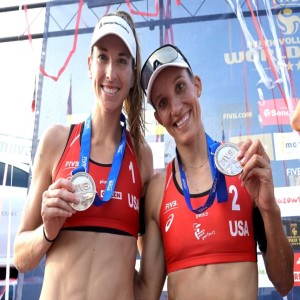
Wednesday Oct 23, 2019
Kelley Larsen and Emily Stockman: Making LAX your new home
Wednesday Oct 23, 2019
Wednesday Oct 23, 2019
There was a time – a very brief time in the middle of a jet-setting, globe-trotting season – where Kelley Larsen had the correct count of how many tournaments she and Emily Stockman had played at that point in the year.
“We did count at one point,” Larsen, an Olympic hopeful with Stockman, said on SANDCAST: Beach Volleyball with Tri Bourne and Travis Mewhirter. “We did a certain amount in a row, we did – what was it? – ten back to back in a row. Ten in a row. I think that was our longest stretch. I don’t know how many tournaments it was this year. I think I lost count halfway through.”
It’s easy to do when you’ve had a year like Larsen and Stockman. The official count, at the moment, with two more tournaments to play, is 19 tournaments in all – five AVP, 13 FIVB, one NORCECA. It has included competition in 13 countries, with a third trip to China coming up next week and a first to Mexico a week after that.
“LAX is our home,” Larsen said, laughing. “It was a lot of travel this year. We were gone six or seven weeks straight at one point and then before and after that we would be at a tournament overseas then come back for a tournament, be home for a few days, and we’d be back and forth. So ever since May, we’ve been gone the majority of the time.”
They knew they were getting themselves into this, Larsen and Stockman. When they both broke it off with their respective partners prior to the onset of the Tokyo race, they knew that international volleyball was the priority, that the Olympics were the goal, and that being anywhere from moderately to severely jet lagged would be the new default.
“I knew her work ethic was already incredible,” Stockman, a Colorado native, said. “Every time I was in the gym she was there, so I knew she was working hard. But to sit down and be like ‘Our goals all align,’ that was huge for me.”
For the most part, everything has seemed to align for Stockman and Larsen this season, both on the court and off. On the court, they won an enormously valuable silver medal at the Warsaw Four-Star and then followed it up with a win at AVP Seattle, Stockman’s first AVP victory. Off the court, their quiet yet warm, independent but caring personalities meshed perfectly. During downtime on the road, Stockman would wander for a good coffee shop; Larsen would take a walk. At home, Stockman retreats to the mountains, Larsen, somehow, still to the beach.
And then they’re back at it, on the beach with coach Evie Matthews or in the gym with their new trainer, an ass-kicking, no-nonsense man recommended by Matthews.
“There’s a lot of teams that sort of started breaking down a little bit and we felt good throughout the year,” Larsen said. “I think a lot of that is due to what we were doing in the gym, just conditioning wise. And all of our training was specific to you and to volleyball. Every movement we do in the gym is very related to volleyball and has a purpose for why we’re doing it.
“His workouts are killer. You get your butt kicked and you don’t lift a single weight. It’s bizarre. It’s definitely helped us conditioning wise in matches this year.”
They have but a few matches left, in China for an upcoming Three-Star in Qinzhou and then a Four-Star in Chetumal, Mexico. Then Stockman will take to the mountains, Larsen to the beach and planning her wedding with Manhattan Beach semifinalist Bill Kolinske. And then, before they know it, season will begin again. And they’ll be back on planes, back to their passports getting tattooed regularly, back in their new home-away-from-home: LAX.
“We’re like the Brazilians now,” Stockman said. “Just nonstop.”
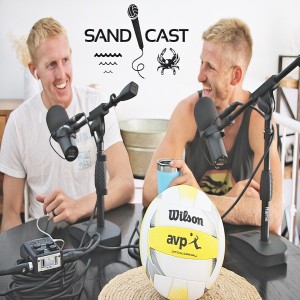
Wednesday Oct 16, 2019
SANDCAST-AVERSARY: Two years and a lifetime of lessons from the podcast
Wednesday Oct 16, 2019
Wednesday Oct 16, 2019
Of all the indelible moments we’ve had on SANDCAST these past two years – and there have been countless many, with massive lifetime milestones from both Tri Bourne and I – none stood out quite like the moments after our latest podcast, which published today.
For the first year and a half, our typical post-show routine was a bit collegeish: We’d barbeque, drink a few beers, watch some football or a documentary or YouTube. Sometimes Trevor Crabb would come over and hang. Gabby Bourne, Tri’s amazing wife and resident ‘Pod Mama’ as we’ve affectionately dubbed her, would invariably be present, joining the boys.
It’s not that those days are over, but things have certainly changed. After we recorded the show on Monday, an exasperated Pod Mama walked upstairs, a crying newborn Naia Zuri Bourne in tow. She passed him off to Tri, and now instead of cradling a Kona or a small glass of red, he was cradling his infant. Listening to Twinkle Twinkle Little Star. Anything to put Naia to sleep.
Life comes at you fast.
“That evolution of where I was, and all of the things that have happened since then, it all started with the SANDCAST,” he said, and he did say this jokingly, because, obviously, there are a lot more important things that have been changing the direction of Bourne’s life. But the podcast, in its 110th episode, has been there to document it all.
It was there, on episode one, to document Bourne when he was deep in the throes of his now-famous autoimmune disease.
“The New Tri Bourne: Buddha Tri Bourne,” is what we dubbed that episode, which, in retrospect, is a funny name, because now that is such an old version of Tri Bourne it hardly seems to exist anymore. That Tri Bourne wasn’t allowed to sweat – “I wanted to sweat,” he said, “but I literally wasn’t allowed to.” He wasn’t allowed to jump, or to lift weights, or to play the sport that is his lifeblood and his way of life, how he supports his growing family.
Now he’s ranked No. 1 in the Olympic race among American teams.
“Yeah,” he said, “that is crazy.”
The podcast was there to document the publication of my first non-fiction book, We Were Kings, just as it was there to document my first main draw, in Austin of 2018 with Raffe Paulis. It was there to document Bourne’s return to beach volleyball, in Manhattan Beach of 2018, which seemed to just be a one-off with his buddy Trevor Crabb, but then it became more. It became a partnership for the next event, in Chicago, where they finished fifth, and the next, in Hawai’i, where they beat Phil Dalhausser and Nick Lucena and took third.
Now, should they continue to play well on the World Tour, they could be Olympians in Tokyo in eight months. With an extra fan, Naia Bourne, cheering him on from phone. With a podcast to document the journey, as it has for the last two years.
“In this situation,” Bourne said of the year-and-a-half in which his autoimmune disease sidelined him, “I had to rethink it all. I was like ‘Alright, all I know is, I want to come out of this better than I was before.’ So I just planned it out. Assuming I was going to get better, I had to stay solid to that mindset: ‘Ok, I’m going to get better, I’m going to get back to where I was, what do I want to have gained from this?’”
He has gained more than he could have ever imagined. He’s switched partners, switched positions, switched roles in life from a newlywed to a dad of a baby girl. He’s written a forward for a book, come back from an autoimmune disease and, remarkably, recorded a career-high finished at World Championships, claiming fourth with Crabb in Hamburg, Germany.
Meanwhile, when Tri and I launched the podcast, I didn’t own a passport. By the end of this year, I’ll have been to 10 countries.
Life takes you places. This sport takes you places.
And gosh is it fun to have a podcast to record every step of the ride.